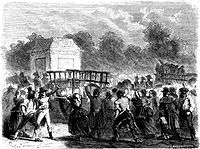Jacques Roux
Jacques Roux (21 August 1752 – 10 February 1794) was a radical Roman Catholic priest that took an active role in the revolutionary politics during the French Revolution. He skillfully expounded the ideals of popular democracy and classless society to crowds of Parisian sans-culottes, working class wage earners and shopkeepers, radicalizing them into a dangerous revolutionary force. He became a leader of a popular far-left political faction known as the Enragés (French pronunciation: [ɑ̃.ʁa.ʒe], "madmen"), and in 1791 he was elected to the Paris Commune.Roux consistently fought for an economically equal society, turning the crowds of sans-culottes against the bourgeois torpor of the Jacobins. He demanded that food be made available to every member of society, and called for the wealthy to be executed should they hoard it. He became popular enough that, as the split between the Girondists and The Mountain grew wider, his voice helped remove the Girondists from the National Convention in 1793. Roux tirelessly voiced the demands of the poor Parisian population to confiscate aristocratic wealth and provide affordable bread.In a controversial 1793 address to the National Convention, Roux proclaimed his Manifesto of the Enragés in which he demanded the abolition of private property and class society in the name of the people he represented. In many ways Roux and the Enragés were prescient in anticipating many of the themes Karl Marx would develop in his analytical theory decades later.Soon, Roux's incendiary rhetoric was igniting food riots and upsetting the balance of power within the Paris Commune. Maximilien Robespierre, fearing Roux threatened the dominance of the Jacobin government, presented accusations of him being a foreign spy intentionally trying to disrupt the revolutionary government and the Committee of Public Safety. During this time, Roux's former friend, Jean-Paul Marat, also turned against him, writing in his newspaper, L'Ami du peuple, that Roux was a false priest that was only interested in religion as long as it provided income. On July 7, 1793, Roux's enemies brought Elizabeth Marguerite Hébert in for questioning in an attempt to charge Roux with extortion and "misappropriation of charitable funds." Hébert was a recent widow with no means to support herself and, two years earlier, Roux had agreed to raise funds for her and her family. When asked if Roux had an ulterior motive, she replied that she did not believe he did. He wasn't arrested then, but in August 1793, Roux was arrested under the charges that he had withheld funds from both the widow Hébert and another widow, Mlle Beaurepaire. Roux assured the revolutionary committee of section Gravilliers that he did nothing of the sort and that his enemies were working against him. Roux was released into the custody of two of his friends, where he continued fighting for his ideals. On September 5, 1793, Roux was thrown into prison again.
Personal facts

| Birth date | August 21, 1752 |
|---|---|
| Birth place | |
| Religion | |
| cause of death | |
| Date of death | January 20, 1794 |
| Place of death |